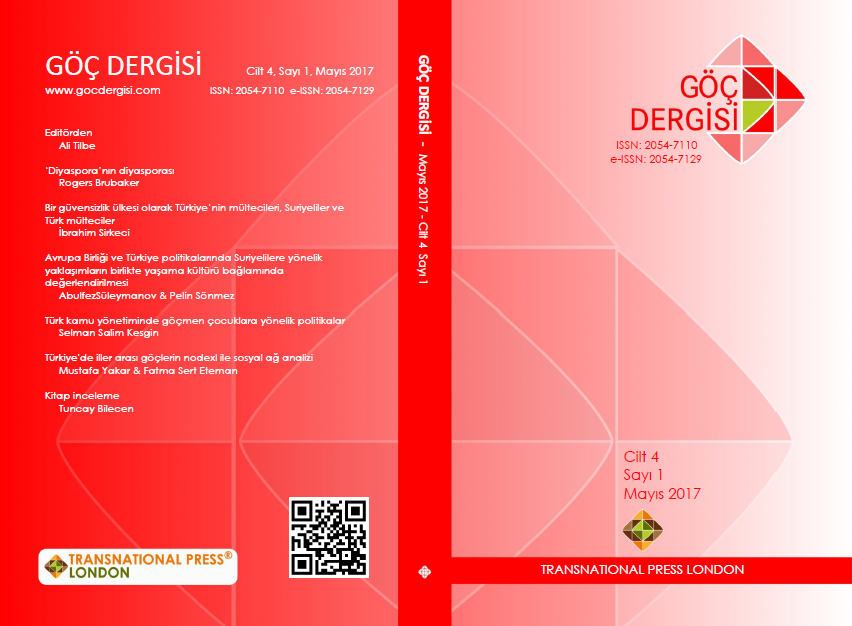Avrupa Birliği ve Türkiye Politikalarında Suriyelilere Yönelik Yaklaşımların Birlikte Yaşama Kültürü Bağlamında Değerlendirilmesi
An evaluation of the European Union and Turkish policies regarding the culture of living together
Author(s): Pelin Sönmez, Abulfez SüleymanovSubject(s): Politics / Political Sciences, Social Sciences, Geography, Regional studies
Published by: Transnational Press London
Keywords: Social exclusion; integration; European Union; migration policy; culture of living together; Toplumsal dışlanmışlık; entegrasyon; Avrupa Birliği; göçmen politikası; birlikte yaşama kültürü;
Summary/Abstract: Türkiye, Cumhuriyet tarihinin en yoğun zorunlu göç dalgasını 2011 yılından bu yana süren Suriye Savaşı ile yaşamaktadır. Suriye vatandaşlarının geçici koruma statüsü altında Türkiye toplumuna her açıdan entegrasyonları günümüzün ve geleceğin politika öncelikleri arasında düşünülmelidir. Öte yandan ülkeye kabul edilen sığınmacıların kendi kültürel kimliğini kaybetmeden içinde yaşadığı ev sahibi topluma uyumu, ortak yaşam kültürünün gelişmesi açısından önem arz etmektedir. Bu makalede, "misafir" olarak kabul edilen Suriyeli vatandaşların Türk toplumunca kabul edilmeleri ve dışlanma risklerinin azaltılmasına yönelik devlet politikaları ortaya konularak, üye ve aday ülkelere göçmenlerin dışlanmasını önlemek için Avrupa Birliği (AB) tarafından sunulan hukuki yapı ve kamu hizmeti inisiyatifleri incelenmekte, birlikte yaşam kültürü çerçevesinde Suriyeli vatandaşlara yönelik toplumsal kabul düzeyleri ele alınmaktadır. Çalışma iki ana bölümden oluşmaktadır: göçmen ve sığınmacılara karşı toplumsal dışlanmayı engellemek için benimsenen yasa ve uygulamaların etkisi ve İstanbul-Sultanbeyli bölgesinde Suriyeli sığınmacılarla ilgili toplumsal algı çalışmasının sonuçları. Bölgede ikamet eden Suriyelilere yönelik toplumsal kabul düzeyinin yüksek olduğu görülürken, halkın Suriyelileri kendilerine kültürel ve dini olarak yakın hissetmesi toplumsal kabul düzeyini olumlu etkilemektedir. ENGLISH ABSTRACT: This article aims to determine the level of social acceptance towards Syrians within the context of cohabitation culture by evaluating EU’s legal structure and public service initiatives in order to prevent Syrian refugees from being excluded in member and candidate countries and by revealing government policies on acceptance of Syrians as “guest” by Turkish society and minimizing the exclusion risks of them. This article consists of two main parts, one of which is based on the effects of law and practices preventing refugees and asylum seekers from social exclusion, and the other is on the results of social perception on Syrians in Sultanbeyli district of Istanbul. At the end of 5-years taking in Syrian War, it is obvious that most of more than 3 million Syrian with unregistered ones in Turkey are “here to stay”. From this point of view, the primary scope of policies should be specified in order to remove side effects of refugee phenomenon seen as weighty matter by bottoming out the exclusion towards those people. To avoid possible large-scale conflicts or civil wars in the future, the struggle with exclusion phenomenon plays a crucial role regarding Turkey’s sociological situation and developing policies. In the meaning of forming a model for Turkey, a subtitle in this article is about public services for European-wide legal acquis and practices carried out since 1970s in order to prevent any exclusion from the society. On the other hand, other subtitles are about legal infrastructure and practices like Common European Asylum and Immigration Policies presented in 2005, and Law on Foreigners and International Protection introduced in 2013. In the last part of the article, the results of a field survey carried out in a district of Istanbul were used to analyze the exclusion towards refugees in Turkey. A face-to-face survey was randomly conducted with 200 settled refugees in Sultanbeyli district of Istanbul, and their perceptions towards Syrian people under temporary protection were evaluated. According to the results, the level of acceptance for Syrians living in this district seems relatively high. The fact that Turkish people living in the same district feel close to Syrian refugees culturally and religiously affect their perception in a positive way: however, it is strikingly seen and understood that local residents cop an attitude on the refugees’ becoming Turkish citizens.
Journal: Göç Dergisi (GD)
- Issue Year: 4/2017
- Issue No: 1
- Page Range: 41-61
- Page Count: 21
- Language: Turkish

